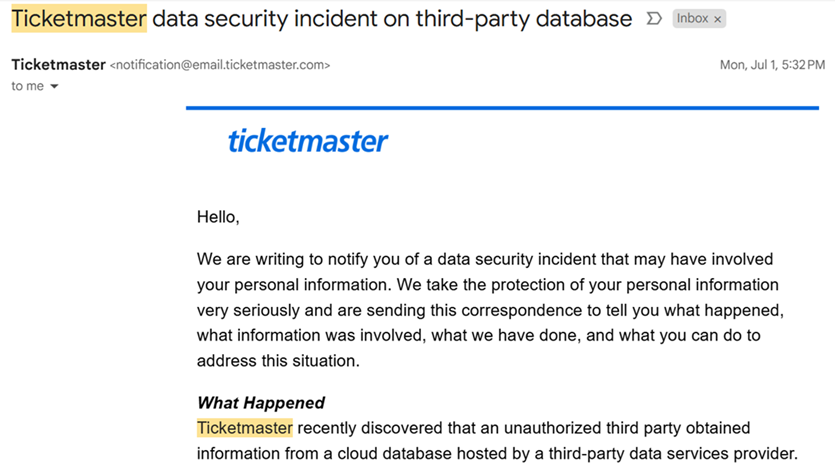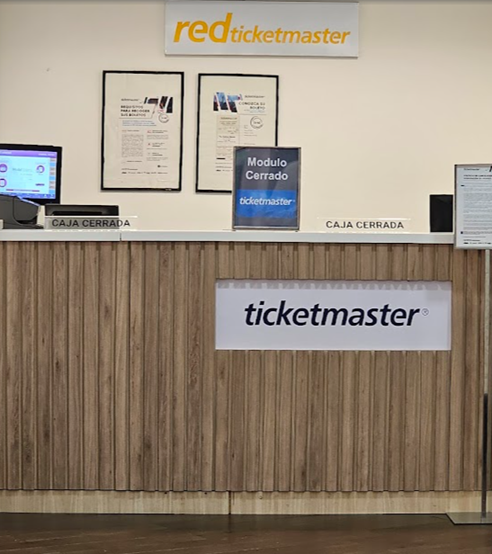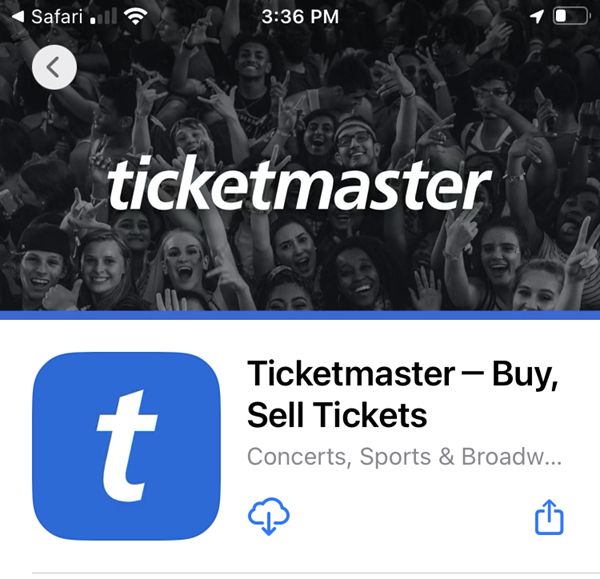A few weeks back, my husband Joe and I learned that our favorite new band, the Irish Indie rock group Fontaines D.C. would be visiting Mexico in 2025 to perform exactly one concert. We were thrilled to have a chance to see this hugely talented band live in Mexico City – and bought tickets through ticketmaster.com as soon as they went on sale.
Less than 24 hours after making the purchase, Joe became alarmed after receiving several emails from Ticketmaster stating that his e-ticket transfers were “on the way” to various third-party accounts.
Having initiated no transfers, Joe immediately logged into his Ticketmaster account and attempted to cancel them. He succeeded– but soon realized the hacker was still in his account, repeating his attempts to steal our tickets after Joe deleted the pending transfers.
A fierce cyberbattle ensued between Joe and the hacker. Eventually, this thief stole both of our Fontaines D.C. tickets, plus another ticket for a show happening later that week. (we managed to protect one ticket in the account after changing the password)
Checking other digital accounts for signs of theft and not finding any, we soon realized it was an isolated issue with Ticketmaster.
In a little bit, I’ll explain how we recovered our tickets. But first, let’s look at how this whole mess got started.
Last May Ticketmaster Had One of the Biggest Data Breaches of All-Time
In late May, Live Nation (the parent company of Ticketmaster) disclosed that Ticketmaster’s customer database had been hacked. The news came via a filing with the Securities and Exchange Commission late on a Friday evening.
In the SEC filing, Live Nation said its cloud-based data storage provider Snowflake had been the target of the hack, but declined to share exactly what data had been stolen.
A few days later, Tech Crunch reported that a cybercriminal group called ShinyHunters claimed to have 1.3 terabytes of data from 560 million Ticketmaster customers and was attempting to sell it on the dark web for USD $500,000.

The hackers selling the data file said it contained customer names, phone numbers, addresses, purchase order details, and credit card information.
On July 1st, a full month after disclosing the breach to the SEC, Live Nation got around to notifying its customers affected by the hack. No explanation was given as to why they waited so long to inform them.
Via an email, Ticketmaster told everyone who had bought tickets to events in the U.S., Canada, and Mexico that their personal data had been compromised during the Snowflake hack.
I received this email myself, which said the stolen data “may include” email addresses, phone numbers, encrypted credit card numbers as well as “other personal information provided to us.” The vague, non-committal way they described what data the hackers had stolen left a bad taste in my mouth.

Besides telling customers about the data breach, Ticketmaster’s email urged customers to “remain vigilant and take steps to protect against identity theft and fraud.” They offered one year of identity theft monitoring services free of charge.
Live Nation also sought to reassure customers and ticketholders their online accounts “remain secure” and that they could “continue to conduct business with Ticketmaster as normal” which struck me as odd given the sensitive nature of the stolen data.
In hindsight, Ticketmaster’s email to customers was more noteworthy for what it didn’t say.
The company didn’t disclose that customers’ account credentials, i.e. usernames and passwords, had been stolen. Nor did it advise customers to change their passwords as a precaution.
The email’s tone probably made some customers complacent — and less likely to take action that would have prevented them from becoming victims.
I can’t help but think that because it was summertime with peak concert/music festival season approaching, Live Nation didn’t want to spook music fans into shunning live events, which would have hurt their bottom line.
Ticketmaster Customers’ Nightmare Continued into the Summer
Since Live Nation disclosed the breach, thousands of their customers have had electronic tickets stolen directly from their Ticketmaster accounts. Fans with tickets to shows by Taylor Swift, Billy Strings, Kacey Musgraves, Greenday, and others, plus some with NCAA football tickets became victims.

Cyber thieves took login credentials stolen from Snowflake to access Ticketmaster customer accounts and transfer any e-tickets they found to their personal accounts. Then, they’d quickly attempt to resell them on sites like Stubhub and Viagogo to unsuspecting buyers.
The original ticketholders typically learned their e-tickets had been stolen only after receiving Ticketmaster emails confirming a “successful transfer” of their e-tickets to unknown third parties. By the time they got this email, it was too late to halt the transfers.
It didn’t have to be this way.
Digital e-ticket theft with stolen credentials was easy because Ticketmaster hasn’t bothered to install security protocols like two-factor authentication on its website or mobile app. Instead of using two-factor authentication, Ticketmaster pushed customers to shift from paper tickets to e-tickets, and introduced randomized bar codes on those e-tickets.
Dynamic bar codes prevent criminals from duplicating and reselling copies of printed tickets. But they do nothing to protect the original ticketholder from illicit electronic transfers and the resale of stolen tickets entirely online.
What more would you expect from a company whose greatest innovation is extortionate junk fees?
Since the hack last May, cyber thieves have posted thousands of stolen e-tickets on digital reseller platforms before Ticketmaster has moved to reverse the transfers or invalidate the e-tickets.
Adding insult to injury, Ticketmaster gave the runaround to an avalanche of customers desperately seeking help following the thefts, saying victims should “wait 3-5 days” to hear back from their fraud department, then never followed up. When customers called back, the cycle repeated itself.
For many of those fans, Ticketmaster’s inaction resulted in missed concerts and lost money.

How We Fought Back and Recovered Our Tickets
We initially contacted Ticketmaster by phone to request that the illicit transfers be reversed. But we could not get through to anyone.
Next, Joe went to the Ticketmaster Mexico Facebook page. He started posting there about the thefts from his account and asking for help. It took 24 hours to get a response.
In the meantime, we’d found a local Ticketmaster office through a Google search. We were really fortunate to have an office located just 15 minutes away from our home in Zapopan.
Joe drove there to plead for help in person. This ended up being the most effective way to get Ticketmaster’s attention.
At the Ticketmaster office in Andares mall, staff reversed the illicit e-ticket transfers. Next, they invalidated those e-tickets and replaced them with paper tickets.

This meant that if our stolen e-tickets had already been sold, we could still enter the show. Whoever bought our Fontaines D.C. e-tickets from a reseller would be the one(s) denied entry.
Visiting a physical Ticketmaster office enabled us to get personalized help far better and quicker than what most customers were offered by phone.
And while our hatred of Ticketmaster ran deep before this incident (for those unfamiliar with its arrogant, monopolistic practices, this article is a great primer), we’re even more motivated to avoid doing business with them now.
But that’s easier said than done.
Ticketmaster controls upwards of 80% of ticket sales for live music events — a situation that’s persisted for nearly three decades. U.S. anti-trust authorities had been sleepwalking on this problem until 2024, when the U.S. Justice Department finally labeled Live Nation a monopoly in the live event sector and filed a lawsuit to break it up.
But it’s far from certain the new Attorney General will pursue this case with the same zeal. So, what’s a live music fan to do?
Ways to Protect Yourself from Ticket Theft
Here are my top recommendations to protect yourself from e-ticket theft and fraud:
- Change your Ticketmaster account passwords regularly, using something unique to Ticketmaster that only you know.
- If possible, buy tickets directly from the event venue box office. A handful of them aren’t owned by Live Nation, so if this is the case, take full advantage.
- If you must use Ticketmaster, buy from a physical office and request paper tickets. Until they adopt two-factor authentication safeguards on their website and mobile app, your e-tickets are vulnerable to hackers.
- Avoid ticket resellers. Apart from the atrocious markups you will pay, resellers traffic in stolen tickets and customers have no way to know which tickets are legitimate and which are invalid. (only the thief and the original purchaser will receive emails from Ticketmaster when an e-ticket gets canceled)
- Don’t buy tickets from private sellers outside an event venue right before a show unless the seller will accompany you to the gate to scan your tickets before payment.
If you become a victim of ticket theft in Mexico and can’t reach Ticketmaster customer support by phone, head to their social media pages to post about the theft and publicly plead for help, or send a message to contactanos@ticketmaster.com.mx . Even better, visit a ticket office in person if you live anywhere near one.
And if all of these tactics fail, you can still file a complaint against Ticketmaster with Profeco, Mexico’s consumer watchdog agency.
Here are the Ticketmaster office locations in Mexico:
Guadalajara (2 locations): Andares Shopping Mall and Centro Magno.
Mexico City (about 15 locations): including Juarez, Roma Norte, and Centro.
Monterrey (2 locations): in Centro, Barrio Antiguo.

